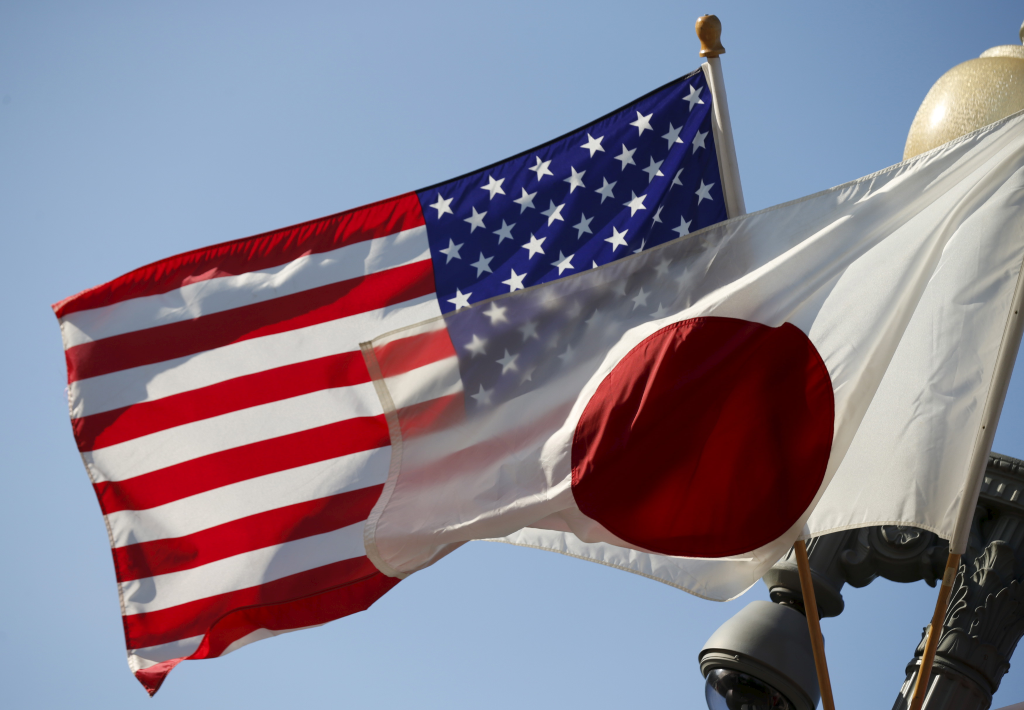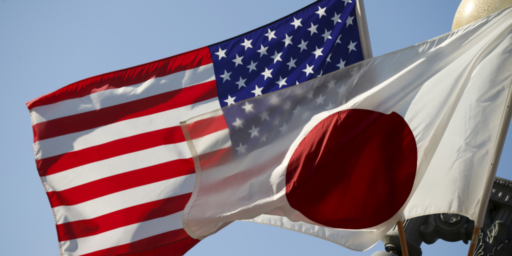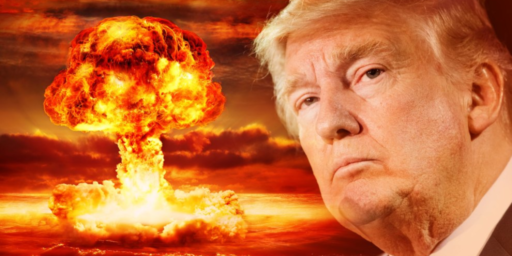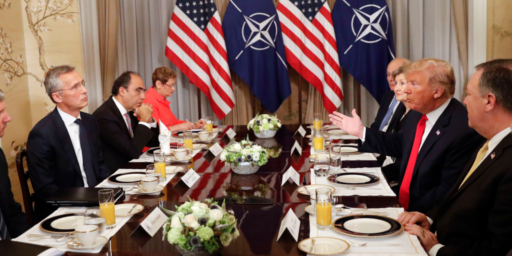Now Trump Is Attacking America’s Alliance With Japan
Not content with taking a wrecking ball to America's trans-Atlantic alliances, the President is attacking our trans-Pacific allies as well.

Jennifer Jacobs at Bloomberg reports that President Trump has been privately talking about ending the defense pact between Japan and the United States, a treaty that has been in place since the end of the Second World War:
President Donald Trump has recently mused to confidants about withdrawing from a longstanding defense treaty with Japan, according to three people familiar with the matter, in his latest complaint about what he sees as unfair U.S. security pacts.
Trump regards the accord as too one-sided because it promises U.S. aid if Japan is ever attacked, but doesn’t oblige Japan’s military to come to America’s defense, the people said. The treaty, signed more than 60 years ago, forms the foundation of the alliance between the countries that emerged from World War II.
Even so, the president hasn’t taken any steps toward pulling out of the treaty, and administration officials said such a move is highly unlikely.
All of the people asked not to be identified discussing Trump’s private conversations. While Trump’s repeated criticism of security pacts around the world has alarmed allies from Seoul to Paris, he hasn’t moved to withdraw from such agreements the way he has with trade deals.
Exiting the pact would jeopardize a postwar alliance that has helped guarantee security in the Asia Pacific, laying the foundation for the region’s economic rise. Under the terms of its surrender in World War II, Japan agreed to a pacifist constitution in which it renounced the right to wage war.
Japanese Chief Cabinet Secretary Yoshihide Suga said Tuesday in response to a question about the Bloomberg News report that the security framework was at the core of the country’s alliance with the U.S. “There is no talk at all of a review of the Japan-U.S. security alliance as has been reported in the media,” Suga said, echoing a statement by the foreign ministry.
Scrapping the treaty would risk ceding security of the Western Pacific to China and potentially spurring a fresh nuclear arms race, if Japan decided it needed to protect itself from nuclear-armed neighbors. It would also call into question the U.S.’s military commitments to Australia, the Philippines, South Korea, Taiwan and a host of other allies around the world
The President repeated this idea in an interview conducted mere hours before he departed for the G-20 Summit in Osaka, Japan, part of which will include another meeting with Japanese Prime Minister Shinzo Abe:
President Donald Trump on Wednesday questioned the fairness of the United States’ longstanding defense pact with Japan just hours before heading to the country for the G-20 summit of world leaders.
The defense agreement, signed in the wake of World War II, is an element of the world order built over the latter half of the 20th century. It requires the United States to come to the defense of Japan in case the island nation is attacked, and allows the U.S. to station troops at military bases there.
“If Japan is attacked, we will fight World War III. We will go in and protect them with our lives and with our treasure,” Trump said during an interview on Fox Business Network. “We will fight at all costs, right? But if we are attacked, Japan doesn’t have to help us at all. They can watch on a Sony television the attack. So, there’s a little difference, OK?”
Trump had privately mused about withdrawing from the defense agreement, Bloomberg News reported this week, though he did not go as far as threatening to scrap the treaty on Wednesday. Pulling out of the treaty would have global implications and would likely reduce U.S. influence in Asia.
According to George Packard, former dean of the Johns Hopkins School of Advanced International Studies, the treaty is the longest lasting alliance between great powers since the 1648 Peace of Westphalia.
Trump’s comments are in line with his “America First” foreign policy vision, which generally views international obligations with skepticism. Ahead of his comments on Japan, Trump offered what he called a “general statement.”
“Almost all countries in this world take tremendous advantage of the United States. It’s unbelievable,” he said.
The Japanese Embassy in Washington did not immediately respond to a request for comment. On Tuesday, the country’s chief cabinet secretary, Yoshihide Suga, told Bloomberg that the two countries were not discussing a review of the U.S.-Japan security alliance.
On some level, these comments from the President are somewhat surprising. Of all of the leaders of our major allies, the President’s best relationship appears to be with Prime Minister Abe. Indeed, Abe was the first foreign leader that Trump had a face-to-face meeting with after he won the 2016 election and the two men have met several times since then and shared rounds of golf both at Trump’s Mar-A-Lago property and in Japan during his visit there earlier this year for his first meeting with newly enthroned Emperor Naruhito. At least in public, the two men seem to have a very good relationship and, until now, Trump has given no indication of any desire to upset an alliance between the United States and Japan that has lasted for the better part of the past seventy years.
On the other hand, the fact that the President is questioning what is arguably and alliance as important to American national interests as the NATO treaty is entirely consistent with the way he’s acted since the beginning of his Presidency. During the campaign, for example, Trump often ranted about the NATO alliance, claiming, largely in a manner that made clear he didn’t really understand how the alliance worked or what it was intended to achieve, that the rest of the alliance was somehow taking advantage of the United States since we contribute the most to the group based on the level of defense spending. At times, indeed, it seems as though Trump had convinced himself that NATO was an organization that charged its members dues and that our European allies had failed to pay their dues for years, leaving the United States to pick up the slack.
Trump continued this them after he became President, particularly during last year’s NATO Summit in Brussels at which he reportedly hit other member nations hard for not yet meeting the 2% defense spending goal that was set in 2014 even though the plan agreed to at that plan gave members until well into the 2020s to get to that level of spending. In addition to that, as I have noted on several occasions — see here, here, and here — he has done more than any American President or any other foreign leader, including the leaders of the former Soviet Union and Russia, to drive a wedge between the United States and its most important allies. These comments regarding our alliance with Japan just serve to show he’s willing to do the same thing to our Pacific region allies that he has done with our allies across the Atlantic, namely spit in their faces notwithstanding decades of loyalty on their part.
The value of the American alliance with Japan are, of course, just as obvious as those that ensue from the NATO alliance. At its beginning, the alliance went a long way toward tempering the foreign policy of nation that had been something of a disruptive and destructive force in the region since it emerged from relative isolation in the 19th Century. This is similar to the role the NATO alliance has played in tempering Germany, which had been a threat to peace in Europe since it first came into existence in the 1870s. In that respect, the alliance has been an overwhelming success to the point where we can now have a discussion about whether Japan should move beyond its current military posture of merely having defensive forces to take on a more co-equal role in keeping the peace in the Pacific region generally.
In addition to this, in recent times the alliance with Japan has played a role in checking the rising power of China in the Pacific. This is one reason why an expanded role for the Japanese military is at least being broached. Additionally, the air, land, and sea bases that the United States is able to take advantage of in Japan thanks to the alliance have proven to be advantageous both in moving men and material but also in helping the United States maintain a presence in the western Pacific that would otherwise be difficult to maintain. Similarly, military hospitals in places such as Japan have been essential in treating wounded soldiers from those and other conflicts. Finally, it’s worth noting that although Japan’s military is limited in the role it can play overseas, it has provided support for American operations in other parts of the world as well as serving as an important adjunct to the American presence in South Korea. For the President to trash that alliance now, when there is no basis for doing so, is both short-sighted and stupid.





“We have no idea which of our most important allies [Trump] will have pissed off worst between now and then.”
-Buttigieg, last night.
@Neil Hudelson: Which goes along with what Jay Inslee said Wednesday night,
I vaguely remember from a catechism class decades ago that part of loving thy neighbor was granting him the benefit of the doubt and putting the most charitable construction on what he did. OK, Trump is an idiot. That’s the most charitable explanation I can come up with for this.
It has been asked before but bears repeating: if a US President were an asset of a hostile foreign power, in what way would his behaviour differ from that of Donald Trump?
Overall the model followed after WWII was to integrate many countries into alliances, trade blocks, and various international organizations. The purpose was to keep the peace and to contain communism.
Regardless of the long litany of wars fought since then, it has largely worked. There have been no wars between the great powers since then.
All these treaties Dennison criticizes as unfair, and as “taking advantage” of America, were negotiated by the US more or less as the US wanted them to be, for the purposes stated above.
Japan once established a colonial empire in Southeast Asia, not too different from Europe’s colonial empires in Asia and Africa. That’s what it was doing in the 1930s, taking over Manchuria, that broke WWII out.
It doesn’t follow that if Dennison withdraws from the defense agreement, Japan will try to invade Korea and China and Indonesia and rebuild its empire. But it would want nukes to deter China and North Korea, and have little trouble developing them, and the ballistic missiles to deliver them as well.
And while the spread of communism is not longer a concern, there’s Russia and China to think about. Russia has already invaded neighboring countries, and taken territory from one.
Tillerson was a terrible Secretary of State, but he got one thing right: Dennison is a f***g moron.
@Montanareddog:
Well, they might be less conspicuous and more subtle in order to avoid suspicion.
@Kathy: The great question at the beginning of the Cold War was whether Russia was trying to expand control because they were commies or because they were Russians. Seems like now we know it’s because they’re Russia.
Trump is a total idiot. Given how the Japanese have a tendency to understate matters, there’s a great chance that they will interpret his comments as an official statement of “the U.S. plans to break up the U.S.-Japan alliance” and go looking around for other allies.
….spoken as someone who worked in the Japanese government for many years….
P.S. Oh, and whatever Japan does, it’s not going to stock up on nuclear bombs.
@Kathy:
No, but they will quadruple the rent we pay for the land our bases sit on. A whole lot of Japanese don’t like our bases and the people on them.
The trash in the White House is incapable of being inconspicuous or particularly subtle…